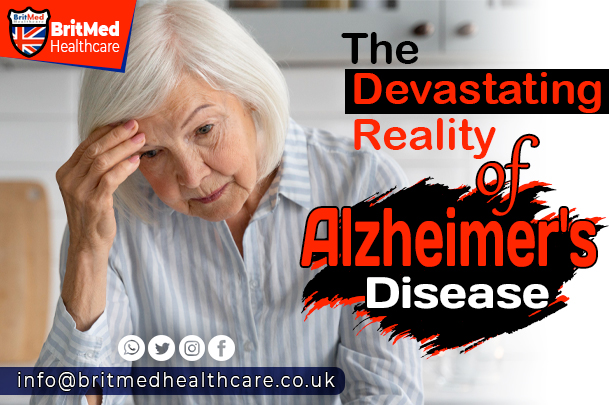The Devastating Reality of Alzheimer’s Disease: A Growing Concern for the UK
Alzheimer’s disease is a degenerative and debilitating condition. It is one of the major concerns for the health service of the UK. Since the population is ageing, the number of those affected by this devastating illness is set to increase along with further strain on the NHS and the economy.
What is Alzheimer’s Disease?
Alzheimer’s is a progressive neurologic disorder that causes the brain to shrink and brain cells to die. The most common symptoms of this illness include memory loss, difficulties in expressing oneself, problems with thought processes, and changes in personality. It was named after the German psychiatrist Alois Alzheimer, who first projected this symptom complex at the beginning of the 20th century. The two proteins that cause the disease are called beta-amyloid and tau. These proteins form insoluble fibrils that precipitate in the brain and damage its cells, eventually leading to a loss of cognitive functions and even death.
Symptoms of Alzheimer’s Disease
The onset of symptoms is very gradual and may take years to become apparent. Diagnosis with absolute certainty cannot be done. The following are some of the symptoms:
- Memory Loss: This may show up as a decline in the ability to remember recent conversations, events, and facts, or to learn new information.
- Confusion: A feeling of disorientation with respect to time, place, and difficulties with spatial orientation are characteristic features.
- Communication difficulties: Difficulty with finding the right words, problems with writing and speaking.
- Mood changes: Depression, anxiety, agitation, and mood swings.
- Personality changes: Changes in personality including withdrawal and suspiciousness.
Risk Factors and Causes
Though the actual cause for Alzheimer’s disease remains unknown, research has identified a number of risk factors that develop in the course of the disease. They include:
- Age: The risk increases tremendously after the age of 65 years.
- Family History: One’s family history of Alzheimer’s disease makes a person more prone to the disease.
- Genetic: Some genetic mutations raise the chance of Alzheimer’s disease in a person.
- Life: Intake of a diet high in saturated fats, sedentary lifestyle, and smoking contribute to higher chances for Alzheimer’s disease.
Diagnosis and Treatment
Diagnosis of Alzheimer’s disease is relatively complicated and requires a combination of medical history, physical examination, laboratory tests, and cognitive assessments. There is no cure for Alzheimer’s disease yet, but a variety of treatments exist that can manage the symptoms and slow down its progression. These include:
- Medications: The medications generally prescribed to deal with symptoms such as memory loss and cognitive decline are cholinesterase inhibitors and memantine.
- Lifestyle modifications: There is the possibility of delaying cognitive decline by promoting healthy dietary habits, regular physical activity, and intellectual stimulation. In summary, these interventions will help patients cope with their condition and possibly live longer and healthier lives.
- Supportive care: Treatment of comorbid conditions such as depression and anxiety provide symptomatic relief and may help in improving the overall quality of life.
Healthcare System Burden
The public health burden of Alzheimer’s disease presents a very serious problem for the UK healthcare system. It is estimated that it costs the NHS £26 billion a year, much of which is due to informal care undertaken by family members and friends.
Conclusion
Alzheimer’s disease is a tragic condition that creates a significant challenge for health systems globally. With the population aging, continued investment in research must be undertaken so effective treatments can be developed to manage symptoms of the illness and slow down its progression. It is also important in this respect that people who have Alzheimer’s disease and their caregivers are afforded support and resources necessary to ensure an improved quality of life.
This has, in fact, been the case with Alzheimer’s disease, which is complex, multi-dimensional, and requires a holistic approach to deal with the vicious consequences that the illness inflicts on the individual and society at large. We can only confront this ugly truth of a debilitating disease through awareness, research, and care by coming together for its mitigation and thereby trying to bring a meaningful change in the lives of people affected with this disease.
References:
https://www.cdc.gov/aging/aginginfo/alzheimers.htm
https://my.clevelandclinic.org/health/diseases/9164-alzheimers-disease
https://www.nhs.uk/conditions/alzheimers-disease/
Websites:
Britmed Healthcare: https://britmedhealthcare.co.uk/
Nightingale Hospital: https://www.nightingalehospital.co.uk/
You can also book on Top Doctors UK Contact us on WhatsApp 08009708017
Top Doctors: https://www.topdoctors.co.uk/doctor/ahmed-el-missiry




